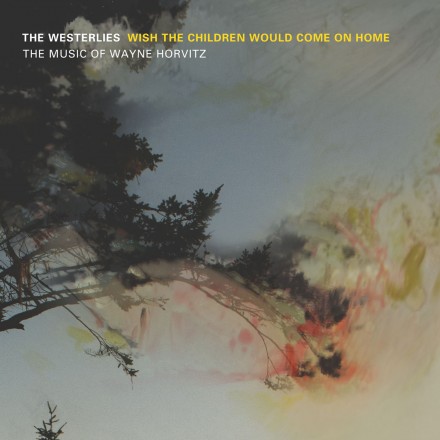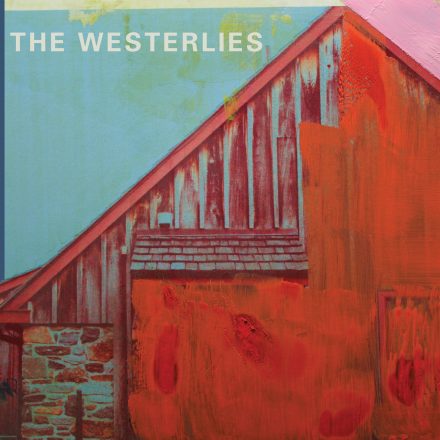The Westerlies
Wish the Children Would Come On Home: The Music of Wayne Horvitz
SGL 1606-2“The Westerlies are super great! Wow. Swinging, grooving, clean and tricky playing. This is the group that, once you’ve heard them, you’ll realize they always needed to exist. Unique, original, exciting. And simply killing in the best sense.”
– Dave Douglas, GRAMMY-nominated trumpeter/composer
Four young Seattle brass players, all relocated to New York City to study at Juilliard and the Manhattan School of Music, decided to form a quartet in late 2011. Through much experimentation they discovered a colorful collective sound that drew from American folk music, indie rock, jazz, and classical music. For the next two years they performed constantly in both cities, creating and developing a large repertoire of original compositions. In early 2013 The Westerlies were approached by their Seattle-based teacher, friend, and mentor, Wayne Horvitz, to create a record of his music. They wholeheartedly agreed; all four of them were already very familiar with his body of work and had played in a number of his ensembles. After exploring his prolific output of the past thirty years, they selected a range of jazz tunes, film music, and classical chamber pieces, and chose to record them on location during their annual summer residency in the San Juan Islands of Washington.
The collaborative process between Horvitz and The Westerlies proved to be challenging and fruitful. On the process of arranging Horvitz’s music, Willem de Koch explains that “the unorthodox instrumentation both forced and allowed us to find our own approach to the music, simply because we can’t follow many of the conventional idioms of traditional jazz.” Riley Mulherkar adds, “The process of arranging varied from tune to tune – some are deconstructed and abstracted from their original context, while others are played nearly verbatim to the sheet music. Improvisation is woven into the fabric of everything we play, so whether in an exposed solo or hidden as a texture behind a melody, we are constantly finding new ways to interpret the music in the moment.” Horvitz’s unique sensibilities shine through in every track; he’s clearly concerned with the sources of contemporary American music, such as blues, jazz, and old-time folk, and his music explores them with a nostalgia not immune to disruption and risk. The Westerlies’ vibrant interpretations of Horvitz’s music makes this album an evocative view of one of America’s most engaging genre-bending artists.
The music is primarily pre-composed, but late on the last night of recording Horvitz joined the band for a few improvisations on his piece “Wish the Children Would Come On Home.” Sections of these takes ended up as interludes on the album, creating a contrastingly freer, darker sonic space than the composed material. Zubin Hensler explains, “We felt it was important to pay homage not only to Wayne’s compositions, but also to his output as an improviser. His improvised work with the late great trumpeter Butch Morris is particularly inspiring to me, and is essential to my understanding of Wayne as a complete artist.” “We all love folk music and Americana, and we’ve always thought of ourselves as more of an improvising folk-brass-band, rather than a jazz or classical ensemble,” says Andy Clausen. “The balance between composed and improvised material was, as much as possible, informed by the tune itself. We sought to make the music our own. In some cases that meant straying from the written material, and in other cases, the improvisation and personalization happened more in the dynamics, inflection and style.”
The Westerlies have developed loyal followings in Seattle and New York and are now booking a US tour for Summer/Fall 2014. “We want to take this ensemble as far as we can,” de Koch says. “There’s a lot of personal investment in the group because, one can’t deny, there’s nothing better than playing music with three of your best friends.” Clausen adds, “The band at its core is an original music brass quartet. We are all composers, and the band existed for over a year before we played anything other than our own stuff. We put that on hold to pursue this project with Wayne, but we are now hoping to re-visit a lot of that older material and compose new music for our next album.” The Westerlies have certainly been keeping busy; in addition to their work with Horvitz, in the past year alone they scored and performed a piece with Juilliard Dance, performed and recorded with indie-folk outfit The Relatives, and created a whole new set of original music that includes drums and piano. The Westerlies’ future is full of promise, for they have already proven to be a truly creative and malleable ensemble, both alone and in collaboration. Wayne concludes the liner notes by saying: “Finally, and importantly, they have the perfect name. Like Henry Cowell, Jimmy Giuffre or any number of iconic Westerners who gravitated to NYC, they bring with them a subtle sensibility that I, myself a lover of the West, hear infused with an openness that is restrained and on fire all at the same time.”

